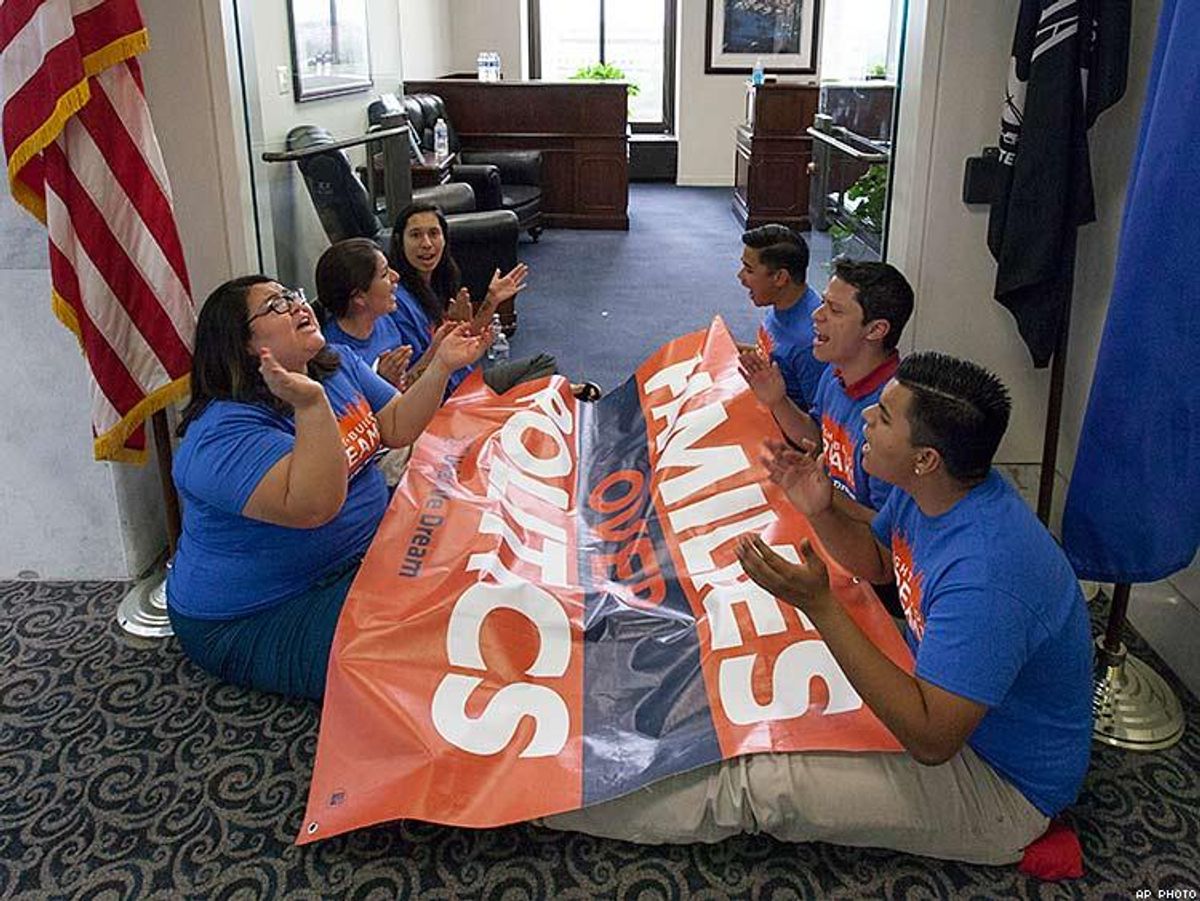The day I received my work permit in the mail a huge sense of relief took over my body. I came to this country at age of 3. It has been almost three years since I was granted the opportunity to work legally in this country. Some will say thanks to President Obama, who announced his Deferred Action Plan for Childhood Arrivals, but I like to believe it was thanks to the deliberate activism of undocumented young folks who staged sit-ins in this campaign offices and urged him to do something. Many of those activists were women of color and many of them were queer.
DACA is an executive action allowing certain undocumented immigrants who entered the country before their 16th birthday and before June 2007 to receive a renewable two-year work permit and exemption from deportation. Contrary to popular belief, this executive action does not grant citizenship or a pathway to legalization; if approved, an undocumented American remains undocumented, but with temporary relief from the threat of deportation.
As someone that has been living in this country for the majority of my life, I felt that this was still not a solution but at the same time I felt grateful that finally this country gave me a break. With DACA I was able to advance my career; things as simple as ordering a drink at a bar and not being rejected for not having a state-issued ID became a huge privilege that was granted to me. While I enjoyed the benefits of being able to go to school, obtaining a well-paying job, and, in many states, the right to have a driver's license, I was also aware of the millions of people who did not qualify for this program. People who unlike me remained in the shadows.
On November 20, 2014, the president announced a new deferred action program called Deferred Action for Parents of Americans or Lawful Permanent Residents, also known as DAPA. Similar to DACA, DAPA grants parents of U.S.-born children and legal permanent residents a three-year work permit and exemption from deportation.
Just two weeks ago, we felt the loss of 49 lives in Orlando. Collectively we mourned them, because they could have easily been us. As we tried to heal, many of us pushed the Supreme Court case United States v. Texas to the back of our minds, because when you are queer and undocumented, oftentimes you have to negotiate what to heal first.
Carrying that grief with us, we patiently waited for a decision that would benefit 5 million undocumented Americans. Last week, it was announced that the court's decision was a 4-4 deadlock, meaning that the dreams and aspirations of 5 million people came at a standstill.
In essence, a positive outcome of United States v. Texas would extend the benefits I have enjoyed to 5 million undocumented Americans who did not qualify the first time around. Unfortunately, last week's decision placed a hold on the lives of these 5 million undocumented Americans. This means that these 5 million undocumented Americans will continue to work in the shadows and continue to live in fear of deportation.
As undocumented queers, it's been a rough month for us. Many of us are left with that question of "What happens next?" Many of us who sit at an intersection of our queerness are painfully aware that somehow all this connected. As undocumented queers we come out of two closets. Often one is easier than the other, but at the end of the day they both hurt the same.
When we live in these intersections, we become aware that we cannot compartmentalize our struggles. What happened in Orlando is connected to what happened in the Supreme Court in the same way that we cannot talk about the rights of immigrants without talking about #BlackLivesMatter.
When you get news like this back-to-back it hurts. It becomes difficult to find the hope to continue pushing. Anger takes hold and we are left wondering, what does this country want to do with us? What more do they need us to prove? Now more than ever we are seeing the importance of building solidarity with the struggles of all people. Your survival is essential to mine and because of it we must continue to resist, to fight, move forward, and better yet, to dance.
 YOSIMAR REYES is a nationally acclaimed poet, educator, performance artist and public speaker. Reyes holds a BA in creative writing from San Francisco State University and is an arts fellow at Define American, an organization founded by Pulitzer Prize-winning journalist Jose Antonio Vargas (DefineAmerican.com).
YOSIMAR REYES is a nationally acclaimed poet, educator, performance artist and public speaker. Reyes holds a BA in creative writing from San Francisco State University and is an arts fellow at Define American, an organization founded by Pulitzer Prize-winning journalist Jose Antonio Vargas (DefineAmerican.com).


 YOSIMAR REYES is a nationally acclaimed poet, educator, performance artist and public speaker. Reyes holds a BA in creative writing from San Francisco State University and is an arts fellow at Define American, an organization founded by Pulitzer Prize-winning journalist Jose Antonio Vargas (DefineAmerican.com).
YOSIMAR REYES is a nationally acclaimed poet, educator, performance artist and public speaker. Reyes holds a BA in creative writing from San Francisco State University and is an arts fellow at Define American, an organization founded by Pulitzer Prize-winning journalist Jose Antonio Vargas (DefineAmerican.com).









































































